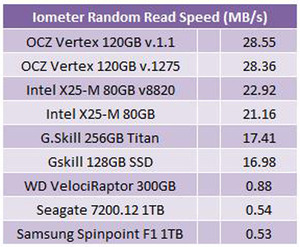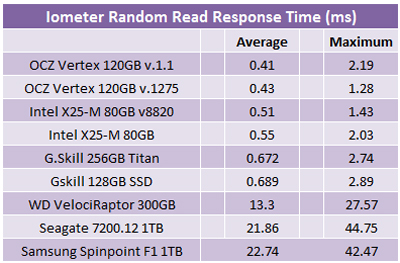
Iometer Results
Website: IometerIometer is a powerful open source synthetic benchmarking tool, able to simulate the effects of a wide variety of software loads and circumstances on either individual hard disk drives and complete drive arrays. In the past we've chosen not to include it due to bit-tech's traditional preference towards real world benchmarks. However, to correctly check for drive stutter caused by extremely high random write latencies there aren't a great deal of options, so we've finally decided to include Iometer in our hard disk testing suite.
For our Iometer testing we used a 4GB portion of the drive and subjected it to random read or write commands or both, depending on the test, of 4KB, with three outstanding I/Os to simulate high level multi-tasking. We ran this each test for two minutes, repeating three times to ensure we recorded an accurate result.
As the differences in read and write latencies and speeds can be so pronounced, we've also included tables of information where appropriate, to help make understanding the random read/write performance differences between different SSDs and conventional hard disk drives easier.
 Random read performance is where SSDs can really flex their muscles and show up competing mechanical drives. This is due to the SSD's use of solid state rather than mechanical storage; when a conventional hard drive needs to read information, the drive's actuator and read head must be sent to a specific location on the drive, a process which takes time due to the physical limitations of a drive's read/write heads, motor and spindle arm.
Random read performance is where SSDs can really flex their muscles and show up competing mechanical drives. This is due to the SSD's use of solid state rather than mechanical storage; when a conventional hard drive needs to read information, the drive's actuator and read head must be sent to a specific location on the drive, a process which takes time due to the physical limitations of a drive's read/write heads, motor and spindle arm. This is evident from our benchmark scores, where even the best mechanical drives aren't able to muster speeds of more than a single MB/s. These slow speeds become apparent in the real world when the drive is tasked with reading multiple files from multiple points of a disk at once, such as when loading an operating system and starting up all the launch applications.
The SSDs were made for exactly this task though, and as a result all post extremely impressive random read speeds. However, it's the Vertex that leads the pack with a whopping 28.55 MB/s random read speed, a result that topples even the Intel X25-M.
 Just as important as random read speed is a drive's random read latency, the time it takes the drive to access the next point of data. Here, as with the read speed, the SSDs have a huge advantage thanks to their solid state memory, and even the slowest SSD has an average access time of less than a millisecond and a maximum access time of no more than 2.89ms - unnoticeable.
Just as important as random read speed is a drive's random read latency, the time it takes the drive to access the next point of data. Here, as with the read speed, the SSDs have a huge advantage thanks to their solid state memory, and even the slowest SSD has an average access time of less than a millisecond and a maximum access time of no more than 2.89ms - unnoticeable.In comparison mechanical hard drives are much slower at this particular task, with even the fastest 10,000RPM VelociRaptor drive averaging a 13ms response time - still extremely quick, but far from what is capable with solid state storage.
The OCZ Vertex takes this one step further, dropping average access times to a tiny 0.41ms while maintaining a healthily low maximum of just 2.19 using the latest v.1.1 firmware.

MSI MPG Velox 100R Chassis Review
October 14 2021 | 15:04








Want to comment? Please log in.